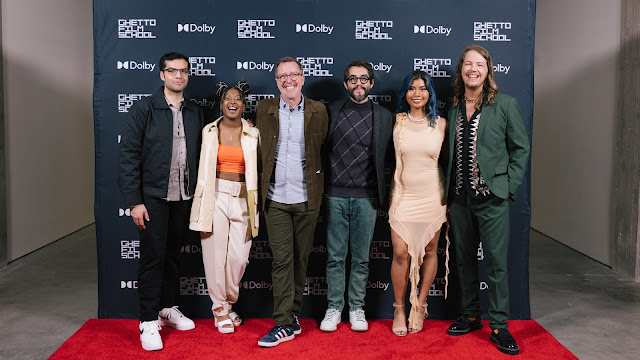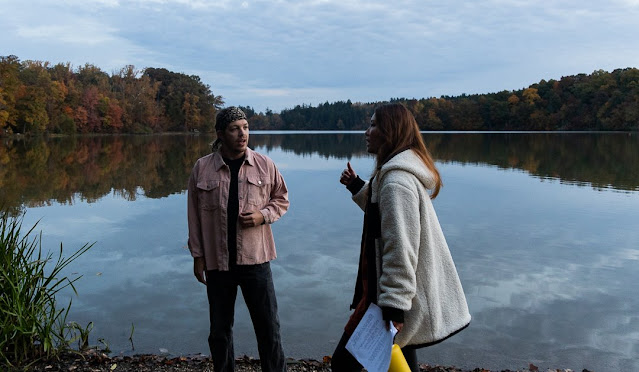.jpg) |
| Thomas Sawyer, right, on the 'Sirens' set with Nicholas Weiss, director of photography > > > |
In many ways, Thomas Sawyer's artistic odyssey began as a means of self-expression, a way to bridge the gap between his inner thoughts and the outside world.
“Growing up, I didn’t have the tools to effectively communicate my feelings and ideas, but through art, I discovered a way to connect with others,” Sawyer says. “I discovered that my true passion was storytelling and that film was the vehicle by which I could best deliver these stories. For me, filmmaking has always been about connection: connection through emotion, through ideas, and through encouragement.”
That passion was recently rewarded when Sawyer, a North Royalton, Ohio, native, was named a finalist in the prestigious Dolby Institute x Ghetto Film School Filmmaker Finish the Script Challenge.
The competition challenges young filmmakers by asking them to finish a script started by Academy Award-nominated director Carlos López Estrada, best known for Raya and the Last Dragon and a multitude of music videos.
As a finalist, Sawyer was awarded a $25,000 grant to make their film and was provided with access to Dolby Atmos and Dolby Vision to use in post-production. Sawyer and the other finalists were then mentored throughout the filmmaking process by Estrada, Dolby, and Ghetto Film School. Once the films were finished, they got the red-carpet treatment.
Sawyer’s short film, Sirens, debuted on May 3 at the Academy Museum of Motion Pictures in Los Angeles. We had the privilege of chatting with Thomas recently via email.

Filmmaker and Northeast Ohio native Thomas Sawyer
Midwest Movie Maker: Tell us a bit about yourself.
Thomas Sawyer (TS): I grew up 20 minutes south of Cleveland. I attended North Royalton High School and the Cuyahoga Valley Career Center’s Media Arts program. After graduation, I immediately jumped into the workforce as a freelance videographer and editor. 
I found my first notable success with Artisans, a short-form web series documenting local makers and the unique fingerprints they leave on their industries. The web series was selected by the Cleveland International Film Festival as a part of the webisodes category’s inaugural year.
I was able to really cut my teeth on this series, and it set me up for success when I eventually made the leap into documentary filmmaking in 2021 with Um Yes, Hello. The film follows a viral TikTok artist and lake conservationist, Geo Rutherford, as she installs an exhibition of found-object art aimed to educate people of all academic levels on how we can protect the Great Lakes.
I feel like every project I have taken on is directly linked to surrounding myself with people from whom I can learn. Filmmaking is completely in line with my life mission: to learn and grow as much as possible and surround myself with people who educate and challenge me.
MMM: What made you want to tell stories through film?
TS: It started simply as a means of self-expression. Growing up, I didn’t have the tools to effectively communicate my feelings and ideas, but through art, I discovered a way to connect with others.
I remember the first time I watched someone’s face light up after seeing a photo I’d taken. Something from my brain existed in the real world and people were reacting to it. It was in this moment I knew I wanted to be an artist. As time went on, I discovered my true passion was storytelling and that film was the vehicle by which I could best deliver these stories.
For me, filmmaking has always been about connection: connection through emotion, through ideas, and through encouragement.
 |
| A scene from 'Sirens' |
MMM: Who - or what - inspires you?
TS: Truthfully, I am more focused on the holes in the film industry than the spaces occupied. There are many movies I enjoy, but what inspires me to be a filmmaker are all the stories that go untold. I have been very fortunate to see people who look like me on screen, but I’ve never been able to find a character that sounds, acts, or thinks like me.
I’m inspired to be a filmmaker to create characters aligned with how I view the world in hopes that future moviegoers and TV watchers won’t feel the void that I have.
MMM: Tell me about Sirens.
TS: Sirens is a coming-of-age, fantasy short film about a teen struggling with their identity. In my teenage years, I carried so much insecurity and fear of not being accepted. I tried to hide who I am in an attempt to fit in. Because of this, I struggled with my mental health and began isolating myself.
It quickly became clear that if “teenage me” was able to see the way I exist in the world now, they would be overwhelmed with these same feelings. I felt compelled to then write a character who is warring with themselves just as I was, but who finds the courage to proudly be themselves much sooner than I did.
Sirens is a beacon for all those feeling insecure and struggling to proudly be themselves. I want to spread a message of encouragement and hope.
MMM: What inspired you to enter the Finish the Script Challenge?
TS: I instantly knew I wanted to enter the second year of Dolby’s and Ghetto Film School’s Finish the Script Challenge as soon as I found the website. The key to my success was finding it 10 days before the submission deadline. I didn’t have time to overthink it.
I knew how impactful the $25,000 grant, access to finalizing a film in Dolby Atmos and Dolby Vision, and the mentorship from Estrada would be on me and my career, and I jumped into action. In those 10 days, I wrote a script, made a deck, and submitted. Three weeks later, I was in Los Angeles for a three-day workshop, starting my journey in narrative filmmaking.
 |
| From left, Miguel Ramirez, finalist; Kaitlyn Ali, finalist; Glenn Kiser, Dolby Institute Director; Carlos Lopez Estrada, filmmaker; Britney Bautista, finalist; Thomas Sawyer, finalist |
MMM: Tell me about the experience. How did you get help to finish your film? Who helped you? How did they assist?
TS: Oh my goodness, this experience has been life-changing. It’s easy to look at the grant as a lot of money to make a short film, especially in the Midwest, but when you really look at all the time and energy Dolby and Ghetto Film School are investing in all of us, they’re investing much more than that, all in the interest of helping young filmmakers succeed. It is a truly incredible program that I wish every filmmaker could be a part of.
As far as help, I knew I’d be getting a lot of it at almost every step of the process, but the most unexpected help came in the form of feedback. During my time in post-production, I was not only able to get insightful feedback from Carlos, but also from Amy Lapides from Ghetto Film School and Kennedy Davey from Maximum Effort.
And because this program has provided such an invaluable experience for its former finalists, I was able to connect with Amy Tiong, a finalist from the first year of Finish the Script and the co-creator of the short film Take Care Zora. She gave me notes that were truly integral to my final film.
After all was said and done, I had 12 sets of eyes on my final project other than my own. All were encouraging without pulling punches, and they helped me craft something of which I’m very proud.
 |
| Thomas Sawyer and actress Joyce Ku discuss a scene |
MMM: What advice surprised you? What unexpected direction did you receive that made all the difference?
TS: I think the biggest “a-ha!” moment for me was learning that directing is less about being creative and more about putting out fires. As soon as I reframed the project in that way, things clicked. Artistry is emotional - which isn’t to say that it’s not important, but I learned that, for me, being a director really means absorbing huge amounts of information, making quick decisions, and solving problems when they arise.
MMM: What are some of the biggest challenges you face as a young filmmaker?
TS: Self-doubt. That is the biggest challenge I’ve faced as a young filmmaker. It’s easy to get discouraged by all the “No”s that come with operating in this industry. It can plant seeds of doubt, paralyzing your creativity and leadership abilities. It is important to build your support system and then communicate to them during moments of insecurity, be available to them when they feel that way, and bring them up with you when you eventually get a “Yes.”
MMM: What advice do you have for aspiring filmmakers?
TS: Go into every situation with humility and gratitude. Learn to see relationships in the industry as friendships, not network connections or leads. Ask as many questions as you can without being annoying or a distraction on set. Be the change you want to see in the industry whenever you are in a leadership role. And feed your people!
 |
| 'Sirens' cast and crew set up on location |
MMM: How do you see the future of filmmaking evolving, and what do you think will be the most significant changes?
TS: Personally, I think we are going to see a surge of small independent films. With social video trending DIY while bringing interesting, unique storytelling and cinematography to large audiences, I think we are going to see a generation of young filmmakers that split the budget of a blockbuster 40 ways and not only make more money for those investors then a single cash grab, but also bring untold stories into the limelight. That might be more of an unrealistic wish and less of a prediction, but I remain hopeful.
MMM: What are your plans for the future, and what kind of projects are you hoping to work on next?
TS: In addition to submitting Sirens to the festival circuit, I’m also in the process of securing funding for my next short film as well as polishing a draft of my first feature script in the hopes of going into production in late 2024 or early 2025. I look forward to continuing with both documentary and narrative film, and providing unique representations that I always wanted to see on screen.


Comments